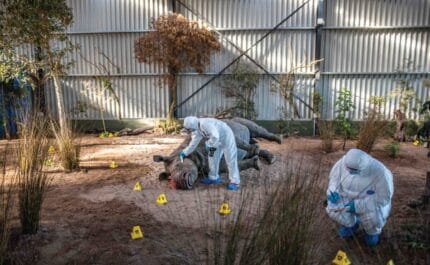A matter of Trust
On 5th November 2022 a dispute between the National Trust and a group of traditionalist rebels came to a head at the organisation’s AGM in Bath. We meet those on both sides of the debate and investigate how Europe’s biggest conservation charity found itself at the centre of the UK’s ‘culture wars’
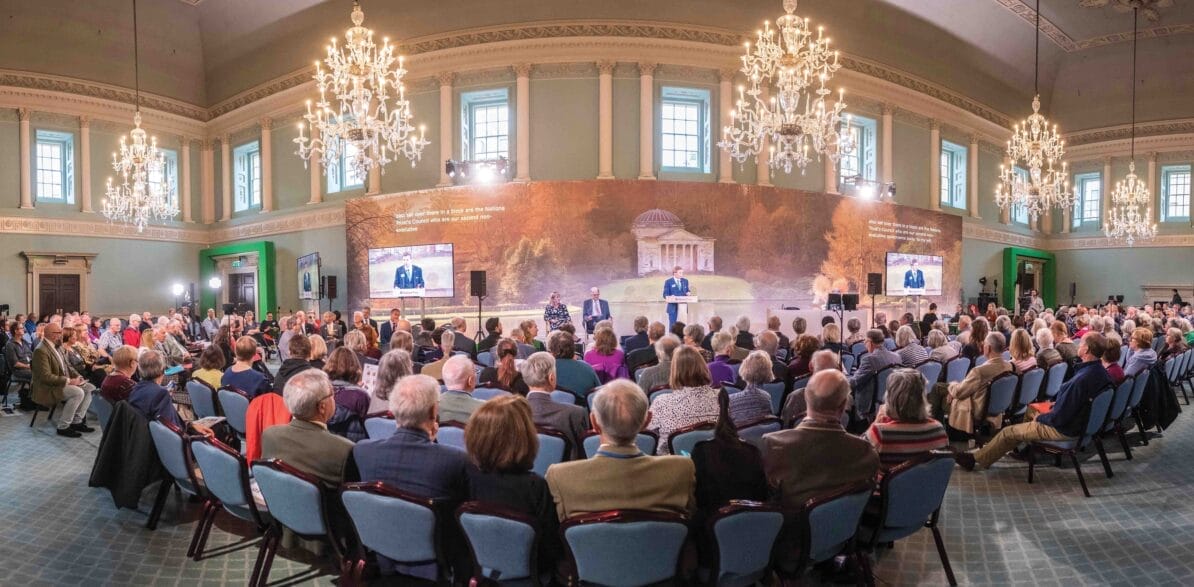
Jan Lasik, the National Trust’s general counsel and secretary, speaks at the 2022 AGM in Bath, Somerset, 5th November 2022. Photo: National Trust Images/Paul Harris
5th November 2022 (Taken from: #49)
No whoops or howls of outrage marked the moment the group calling for a change of direction at the National Trust discovered they would be leaving the conservation charity’s 2022 AGM without a single victory. To the sound of respectful silence, Jan Lasik, a softly-spoken legal counsel for the 128-year-old organisation, announced that Restore Trust’s resolution over proxy voting had not been carried. The calm at the 18th-century Bath Assembly Rooms belied the intensity of an impassioned debate over the future of the organisation, which in recent years has spilled out of country houses and into furious newspaper columns, social media spats and even the Houses of Parliament.
To say that the hostilities between the National Trust and those who seek to reshape it began in a garden shed in a Birmingham suburb is a bit of a stretch. But the quirkily furnished wooden hut where I meet Professor Corinne Fowler is where she worked on the report which, perhaps inadvertently, propelled the National Trust to the front lines of Britain’s ‘culture wars’.
At first the University of Leicester academic’s work with the charity raised few eyebrows. The Colonial Countryside project she directed, which began in 2018, saw 100 primary school-age pupils visit National Trust properties and learn about their colonial histories. “It was very positively viewed,” Fowler, a professor of colonialism and heritage, tells me over large mugs of tea on a cold January afternoon. Books on black British history and the English countryside share shelf space with teddy bears and teapots. Fluffy white pillows are neatly stacked on a floral-patterned chaise-longue. “But after the report came out,” she says, “it all changed.”
On 16th September 2020 the National Trust published its Interim Report on the Connections between Colonialism and Properties now in the Care of the National Trust, Including Links with Historic Slavery. The 115-page document, co-edited by Fowler and three National Trust curators, included chapters on topics such as the East India Company and the British Raj followed by what the Daily Mail would describe as a “BLM-inspired list of shame” – in reference to the Black Lives Matter protests – of 93 properties with links to colonialism or slavery. These included Powis Castle in Wales, home to a collection of South and East Asian artefacts amassed, or looted, by the family of ruthless East India Company general Robert Clive. Penrhyn Castle, built on the proceeds of the transatlantic slave trade, was also on the list. And so, more contentiously, was Chartwell, the former home of Sir Winston Churchill.
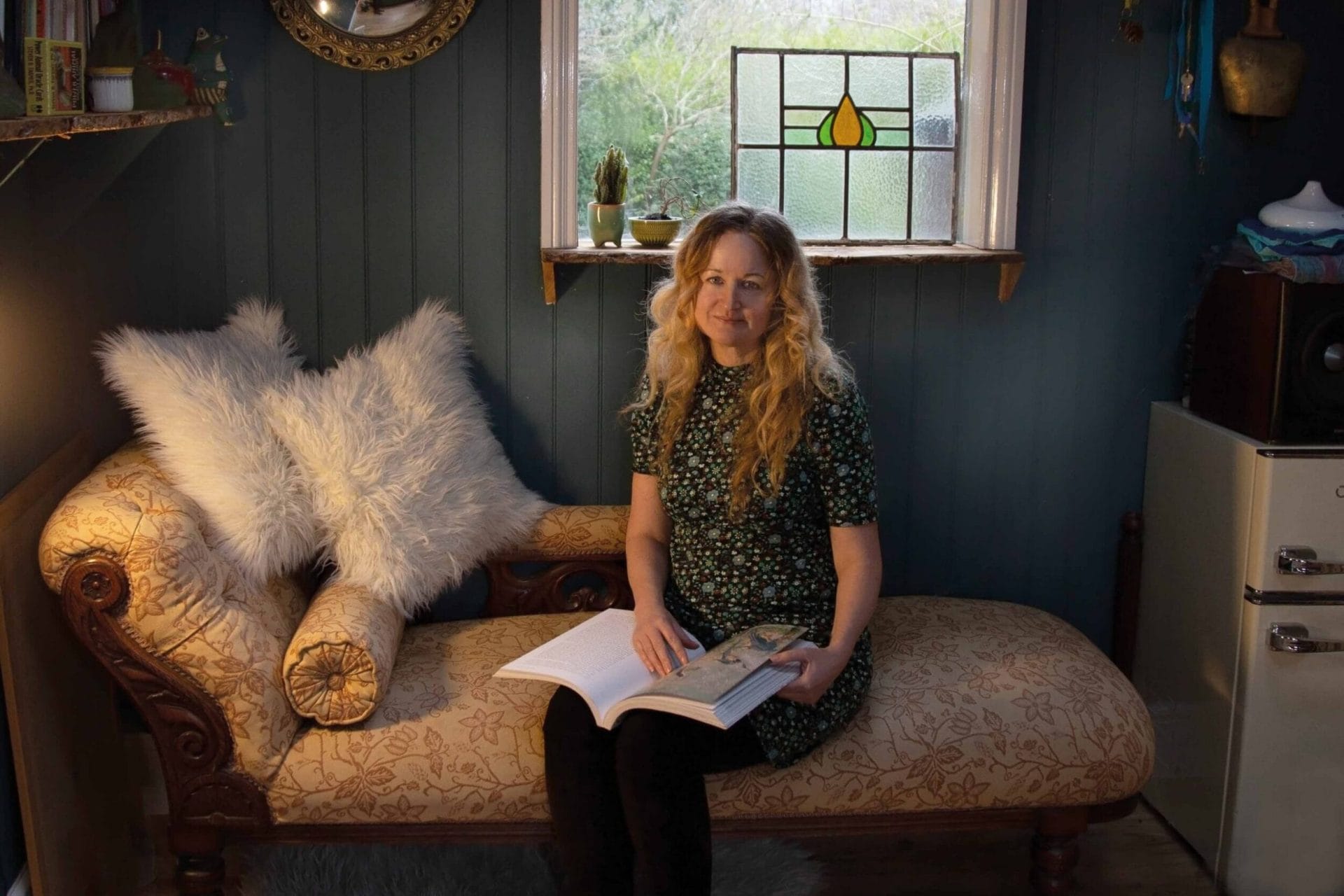
Professor Corinne Fowler of the University of Leicester in the garden shed where she worked on the National Trust’s interim report on its properties’ links to colonialism and slavery. Photo: Jess Orchard
For some critics of the National Trust, the report seemed to confirm suspicions that the charity had become politicised, taken over by ‘woke folk’ looking for any excuse to disparage the nation and its heroes. In November 2020 the Telegraph published a letter about the National Trust’s report from the Common Sense Group, an informal association of Conservative MPs and peers. It said that “institutional custodians of history and heritage, tasked with safeguarding and celebrating British values” should not be “coloured by cultural Marxist dogma”, using a term, perhaps inadvertently, which has a history as an antisemitic trope. The report “implicitly tarnished one of Britain’s greatest sons, Winston Churchill”, the letter said.
“The criteria for inclusion were clear,” says Fowler on the decision to include Chartwell. “If one of our criteria for including or excluding people was colonial governance, then if we have William Blathwayt, an important colonial administrator in the 17th century, it wouldn’t make historical sense to leave out Winston Churchill, who was colonial secretary [in 1921-22].” Any criticism of Churchill in the report isn’t explicit – it states that he was prime minister “during the devastating Bengal Famine of 1943, the British response to which has been heavily criticised”, and cites two occasions on which the wartime leader opposed Indian self-governance or independence.
Visitors don’t have to engage with this history if they don’t want to”
The criticism of the report had potentially serious consequences for the National Trust. The Charity Commission opened a regulatory compliance case to look into whether, by examining the links between their properties and colonialism, they acted outside of their charitable purposes; it eventually concluded that they didn’t breach the law. Meanwhile, Common Sense Group members urged then-culture secretary Oliver Dowden to investigate public funding for the National Trust’s projects while another Tory MP, Andrew Murrison, secured a parliamentary debate on the future of the organisation. On 11th November he told MPs that a “plain shoddy” report did not reflect the needs of the charity’s members, which “like me and my family flock to National Trust properties to admire an elegant pile of bricks or a beautiful landscape before going for a nice cup of tea and a slice of cake – job done, and happy days.”
“Visitors to National Trust houses don’t have to engage with this history if they don’t want to,” says Fowler when I read her Murrison’s remark. “It’s fine for people to switch off, not engage, and have a good day out, but it’s also important to remember that this history impacted the lives of millions of people all over the world.”
I raise another criticism of Fowler’s work. Churchill biographer Andrew Roberts said the National Trust was “trying to imply a moral equivalence between colonialism and slavery”. The British empire, Roberts argued in an article for a private conservative US college, was “overall a noble endeavour that for the vast majority of time brought great benefits for most of its native inhabitants”, while slavery was a “disgusting evil” which Britain campaigned against “for most of the 19th century”. In an editorial the Times described the “conflating of slaving with merely supporting the British empire” as the report’s “fundamental mistake”.
“I don’t understand the historical logic of this argument,” says Fowler. “Slavery was part of British colonialism. If you follow the history of the country houses, it will give you a mixed picture of colonial activity of wildly different types during different periods of the British empire… There’s this objection to conflating supposedly two distinct histories but they were often happening concurrently.” She describes Roberts’ criticism as taking a “balance sheet approach to history… making judgements over what’s good or bad… It doesn’t really progress historical knowledge, which is about the messy overlaps and interlocking relationships between different types of colonial activity.”
The furore over the report had one sadly predictable repercussion for Fowler. She says she removed her email address from her university faculty website at times because she couldn’t handle the volume of hate mail she was getting. She says she doesn’t blame people for being angry because the media coverage of the report was often “a distortion of the work” and she reveals that she often “parted on good terms” with senders of unpleasant messages after “replying respectfully and explaining the articles’ misrepresentations.”
What was harder to counter, she says, was seeing her and her colleagues’ credibility and expertise questioned in such a public way. In the Telegraph, Simon Heffer said that judging by the quality of the report, few of those behind it “would deserve even the lowest class of history degree from the worst imaginable university.” In a separate column the historian and columnist criticised its lack of “intellectual heft” and “historical expertise”, and called the report a “nakedly political project”. He was far from the only commentator expressing such opinions.
It’s patronising to assume children can’t learn unless you’re constantly entertaining them”
Fowler describes the report as an audit of peer-reviewed historical research and rejects the idea that it was in any way a work of activism. She believes she was the target of a “smear campaign”, a “troubling collective attempt” to discredit her and her colleagues, and says that female academics are treated differently to their male colleagues. “The vast majority of historians of empire would not have any problem with the report,” she insists. “That’s because we weren’t imposing an interpretation [of the history], we were simply auditing what was known about the houses so we could see what further research needed to be done.”
“We study the history of empire and have done so for a long time,” Fowler continues. “We’ve spent a long time building up our reputations and they are justifiably very strong. We were simply doing our job.”
In October 2022 the National Trust opened the Children’s Country House at Sudbury Hall in Derbyshire, which they said would help “spark a lifelong interest in heritage”. Over its 12 rooms kids can play, dance, do arts and crafts and join an escape room-style experience in the WW2-themed ‘mystery rooms’.
“I think it’s patronising to children,” says Cornelia van der Poll, the co-founder and chair of Restore Trust. “[Sudbury Hall] is a pity, it’s a waste. It’s a beautiful, tranquil place that people could otherwise enjoy in their own way, with their own thoughts, and with their children maybe. It’s a dreadful error to say you have to put [in] balloons, art installations, disco lights and speech bubbles to amuse children… It’s patronising to assume they can’t learn unless you’re constantly entertaining them.”
At a cafe in London’s neoclassical Somerset House complex, Van der Poll tells me that she’s been “anxious about the National Trust for a long time.” She’s been a member of the conservation charity since her early twenties, but began visiting historic houses on her own around the age of 12. An academic specialising in ancient Greek, she’s an unabashed traditionalist. She’s never owned a smartphone, she says, showing me her trusty Nokia. A spiral-bound A-Z London map sticks out from her handbag.
She was moved to set up Restore Trust with solicitor Jack Hayward in 2021 after a year when “everything went a bit mad”. The interim report was one part of the madness, she says, but the reason she wants to talk about the Children’s Country House is because she believes it’s symbolic of a wider decline in standards at the National Trust.
Van der Poll says that an internal National Trust document leaked to the Times in August 2020 concerned her more than the colonialism and slavery report. The ten-year strategy report referred to an “outdated mansion experience… serving a loyal but dwindling audience” and included the suggestion that more objects should be moved into storage in order to “flex our mansion offer”. The proposals – and the jargon – “set the alarm bells ringing”. “I was worried that people were thinking of doing drastic things to places that had largely been left alone for a long time,” she says.
The National Trust was founded by Octavia Hill, Sir Robert Hunter and Hardwicke Rawnsley in 1895, a time when rapid industrialisation appeared to pose a threat to Britain’s natural landscape. According to the first National Trust act, passed by parliament in 1907, the organisation’s purpose was “promoting the permanent preservation for the benefit of the nation of lands and tenements (including buildings) of beauty or historic interest.” It’s a quote that appears prominently on the website of Restore Trust, alongside their argument that the charity has drifted from its founding principles.
For most of the previous century, that argument goes, the National Trust was a global leader in preservation, with the most eminent experts in their fields charged with ensuring the founders’ charter was realised. But over time the charity became too big for its own good. It became more corporate, obsessed with visitor numbers and money, and it started replacing specialists and experts with curators, consultants and managers. The 2015 introduction of four brown leatherette bean bags at Ickworth House in Suffolk – or, for that matter, a mirror ball and a neon sign with the words “Party like it’s 1699” at Sudbury Hall – may not offend the average visitor, especially those with tired legs or small children, but to those on the traditionalist wing of the organisation they represent a “relentless diminution of standards”, a lamentable dumbing-down. They are symbols of a once-great institution that has lost its way.
Seen through this lens, a perceived lack of academic rigour in the interim report on colonialism and slavery – a notion fiercely rejected by those who worked on it – is another symptom of the malaise. Van der Poll says that she has no problem with the colonial histories of the properties being researched and published but that the report took things out of context and presented things selectively. “The most egregious example is Churchill and the Bengal Famine,” she says. “Churchill was prime minister. The Bengal Famine happened. It heavily insinuates that ergo Churchill was a bad man who wanted Indians to starve.”
She also questions whether the report was published without a political agenda. It was released at the height of the BLM protests, in the aftermath of the police killing of George Floyd in Minneapolis. A febrile atmosphere in Britain was heightened by the disconcerting ‘new normal’ of pandemic lockdowns. BLM protesters in Bristol threw a statue of slave-trader Edward Colston into the city’s harbour and a Churchill statue in London was daubed with the words “was a racist” after his name. Some assumed that the National Trust was, as Charles Moore suggested in the Spectator, rushing to be seen to be “taking the knee”, in reference to the anti-racism gesture and ‘culture wars’ flashpoint. In fact, the charity’s public work on empire began several years before the BLM protests reached these shores, but in a March 2021 podcast interview with Jeremy Paxman, National Trust director Hilary McGrady described the timing of the report’s publication and “allowing it to be conflated” with BLM as her “biggest mistake”.
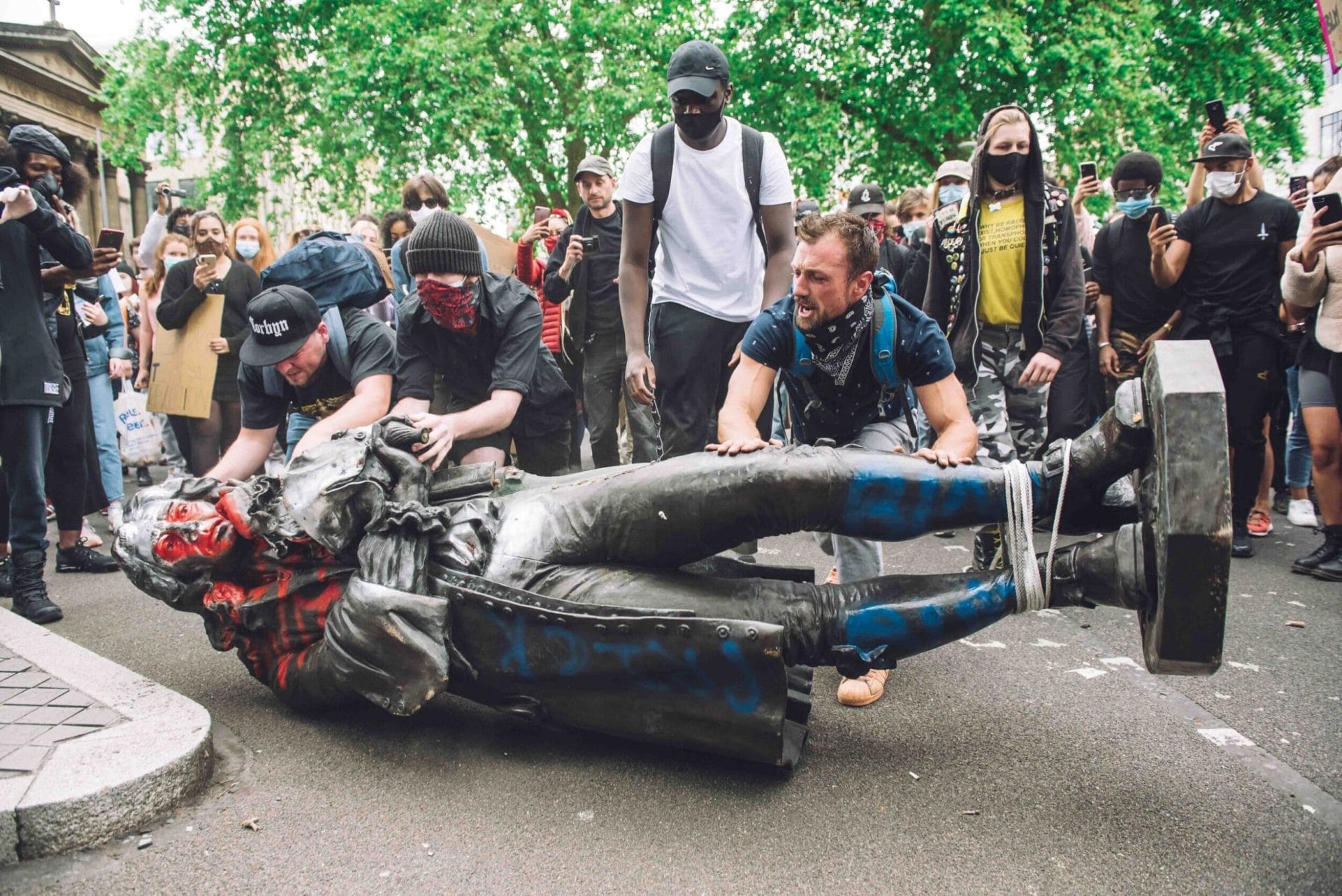
Protesters in Bristol push a statue of 17th century merchant, politician and slave-trader Edward Colston towards the docks on 7th June 2020. Photo: Giulia Spadafora/NurPhoto via Getty Images
It looked as though the National Trust’s former chairman, Tim Parker, made another BLM-related error when in November 2020 he referred to it as a “human rights movement with no party political affiliations” in a letter to a member complaining about the interim report. His comment sparked further accusations of ‘wokery’ in some sections of the press. On 24th May 2021 the newly-formed Restore Trust set out plans to put forward a motion at that year’s AGM declaring that Parker had lost the confidence of members and should resign. They argued that his “leadership has frequently been out of step with its members and supporters over recent years.” Less than 24 hours later, Parker announced that he would step down in October. While Restore Trust said they were “pleased” that Parker resigned “following the publication of our motion”, the National Trust said that Parker had told trustees of his decision to resign six days earlier.
Restore Trust entered the October 2021 AGM in Harrogate, north Yorkshire, with the wind in its sails – and, it was reported, support from more than 10,000 current and former National Trust members and a £50,000 war chest. Any National Trust member can submit a resolution to be considered at the AGM, and since the leaders of Restore Trust are all members of the National Trust they put forward three resolutions, one of which, on disclosing the salaries of National Trust senior staff, was passed with the backing of the charity’s governing body, the Board of Trustees. Their resolutions calling for greater curatorial expertise and better treatment of volunteers were only narrowly defeated, with assistance from the chairman’s proxy vote system, which allows members unable to vote to allow the chair to vote on their behalf.
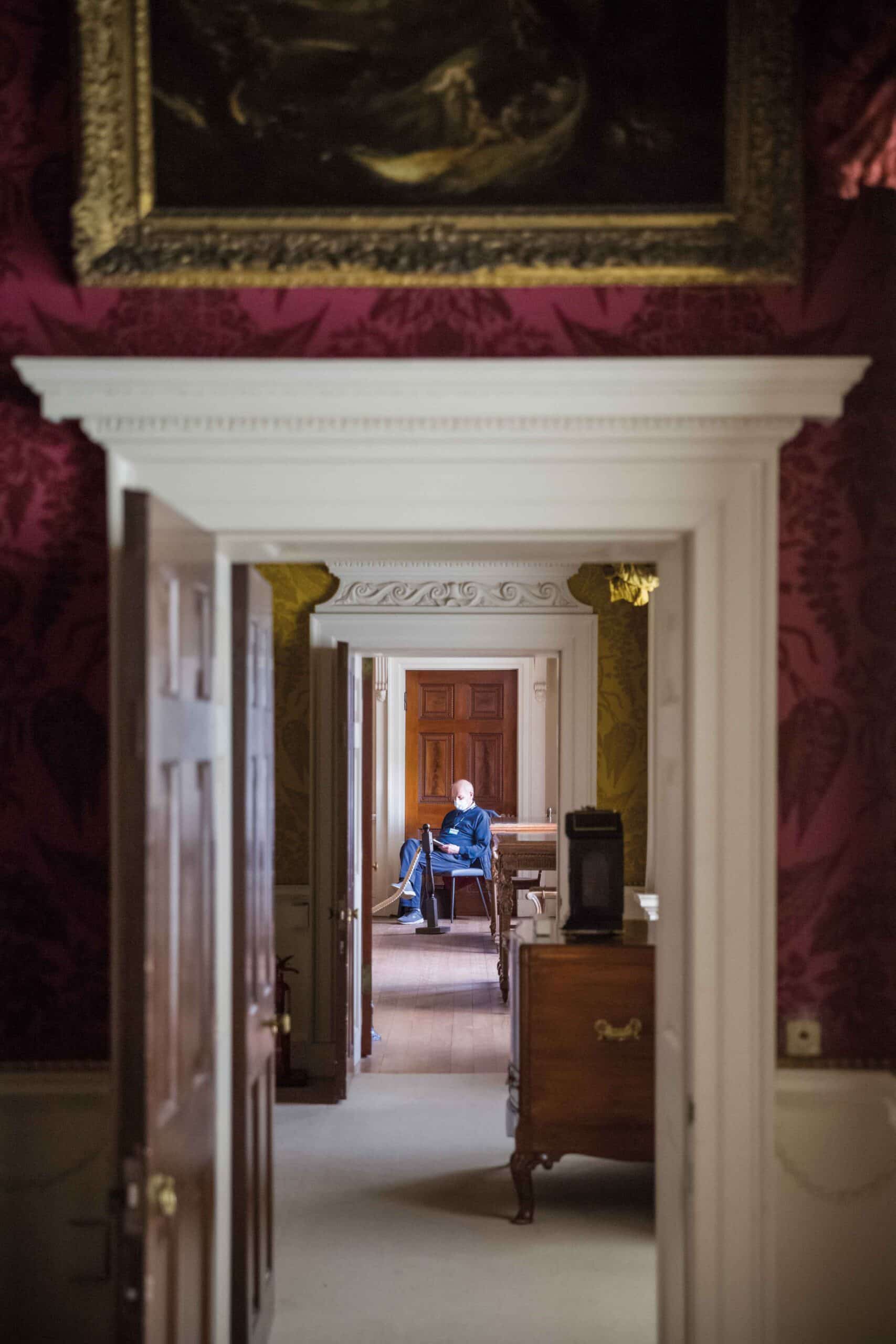
A volunteer seen through an enfilade of rooms at Nostell Priory, one of the properties referenced in the National Trust’s interim report on links between its properties and colonialism. Photo: ©National Trust Images/James Dobson
Half the people on the 36-seat National Trust council, whose role involves appointing, advising and monitoring members of the Board of Trustees, are elected by the organisation’s members. In Harrogate, where three of the six candidates endorsed by Restore Trust were voted in, it got a bit messy. One of the successful endorsed candidates, Michael Goodhart, told reporters that Restore Trust had never contacted him or spoken to him, that he didn’t “support many of their broad aims” and was “very concerned” to be associated with them.
Moreover, one of the Restore Trust-endorsed candidates who failed to be elected to the council was Stephen Green, the leader of the fundamentalist Christian Voice group who has a history of misogynistic and homophobic remarks. Van der Poll denies that her group is in any way homophobic and says they have “supported two candidates who have campaigned on gay issues in some form”. However, when I ask her if endorsing Green was a mistake she suggests otherwise. “At that time he was concerned about members’ money being spent on promoting social causes, and we had a similar concern about members’ money being spent on things that are not part of the Trust’s charitable objects.” Green had criticised members’ subscription fees being spent on Pride events and it’s believed that he put forward the resolution to end National Trust involvement in Pride at the November 2022 AGM.
Our job is to do the maximum good… for the maximum number of people”
After the disappointment at the 2022 AGM in Bath, the Guardian wrote that Restore Trust had “failed to wrest control” of the National Trust. Van der Poll denies that control of the council is their goal. “We absolutely don’t want that,” she says. “What we do want to see is a diversity of views, a genuine diversity so there’s proper debate, so that competing visions are genuinely considered.”
After our interview at her London office, Celia Richardson tells me that she’s just been interviewed for a podcast called Why Everybody Hates You (episode title: ‘Why Everybody Hates the National Trust’). Billed as an “audio support group for reputation professionals”, the show’s name is an in-joke – but while ‘hate’ is too strong a word it’s safe to say that the National Trust’s director of communications and marketing is not the most popular person among the management of Restore Trust.
On her personal Twitter account Richardson’s bio says she is “leading with tea, scones and optimism”. A shortage of the first two items at the National Trust would never be allowed to happen, but I ask her whether the pandemic lockdowns, the 1,300 job cuts announced during that period, the relentless criticism in the right wing press and the Restore Trust insurgency left her in short supply of positive thoughts. “The thing that challenges anyone’s optimism who works in conservation is climate and biodiversity crises,” she replies. “So yes, there are political rows around big institutions – ‘we’re apolitical but nobody told politics that’ is what we always say – but they don’t necessarily get in the way of optimism because we know they’re often short term, reactive to current circumstances.”
While she answers my questions about the report and the rebels graciously, Richardson would clearly rather be talking about almost anything else. The fallout from the interim report and other ‘culture wars’ issues, such as reported possible member boycotts over the installation of gender-neutral toilets at some properties, seemed to suck up all their media coverage. The National Trust wanted to talk about planting blossom trees, caring for otters, protecting endangered crayfish and so on, but everything that wasn’t ‘woke vs unwoke’ could barely be heard over the noise. Richardson rejects the suggestion by some critics that a significant proportion of the National Trust’s membership is disillusioned with the direction the charity is taking. “We listen to people and when we know that something is upsetting our members we try as hard as we can to respond to it,” she says. “Sometimes people will disagree with our decisions… But there have always been people who have disagreed with something we’re doing… Our job is to do the maximum good as a charity for the maximum number of people.”
For Richardson, this utilitarian principle means doing things like supporting Pride events (“We’re a heritage organisation and LGBTQ history is part of everyone’s history – why wouldn’t we be involved?”) and installing those “patronising” disco balls at Sudbury Hall (“There is only one Children’s Country House and a fifth of our members are under 17 – why wouldn’t we do some stuff for children?”).
The ‘culture wars’ stuff may have been a source of frustration, yet Richardson has thrown herself into a few testy exchanges with Restore Trust on Twitter. On one occasion, the group suggested that part of the reason the National Trust “has departed from its founding values and objectives” is “thanks no doubt in part to the hiring of people like you, Celia: PR specialists who are English Lit graduates rather than specialists in the preservation of historic houses and gardens.” Richardson laughs when I remind her. “It would be a brave organisation that appointed a director of communications based on their expertise in historic buildings, frankly,” she says.
In a separate exchange in September 2022, Restore Trust told a user that they didn’t consider the National Trust an enemy because they are “part of the National Trust ourselves”. Richardson, irritated by what she perceives as efforts by the group to mislead people over their actual identity (they are National Trust members as opposed to National Trust employees), replied: “Restore Trust is NOT part of the National Trust. Restore Trust is the trading name for RT2021 Ltd, a private company.”
On 6th February 2023 the Good Law Project published a short video on social media summarising the previous month’s achievements. It was presented by Alicia Lawson, a legal assistant at the non-profit founded by lawyer and activist Jolyon Maugham, which aims to use the law to “uphold democracy, protect the environment and ensure members of marginalised groups are not left behind by society”. “We’ve been looking into the issue of dark money for a while now, and our campaign to stop Restore Trust, a right wing body that sought to influence the National Trust, ended in success. We revealed their links to 55 Tufton Street and their misuse of people’s data,” said Lawson in the video.
55 Tufton Street is a Georgian townhouse in Westminster, London, which houses organisations including the TaxPayers’ Alliance and the Global Warming Policy Foundation, and which used to be home to the pro-Brexit Vote Leave campaign. The TaxPayers’ Alliance had links with Liz Truss – she appointed its former chief executive Matthew Sinclair as her economics advisor while prime minister – and the Global Warming Policy Foundation is behind Net Zero Watch, a climate-sceptic think-tank which says it highlights “the serious implications of expensive and poorly considered climate change policies.” The chairman of Net Zero Watch, which lists its address as 55 Tufton Street, is Neil Record – and the Good Law Project say that by searching public records on RT2021 Ltd they were able to reveal that Record was also one of Restore Trust’s directors. Here, it seemed, was a link between Restore Trust, which claims to be politically independent, and the right wing think-tanks at Tufton Street.
But the fact that Record is a director of Restore Trust is not a revelation. At the time of the National Trust AGM in October 2021 he was listed on their website as a director with a photo next to his name. It also wasn’t clear how the Good Law Project had “stopped” the group, which remains active. To get some clarity I speak to Ian Browne, the legal manager of the Good Law Project, who worked with data rights firm AWO to launch legal proceedings against Restore Trust. He says he has a particular interest in the splinter group because he’s a National Trust member himself and he saw Restore Trust as “an organisation that was trying to influence the internal democracy of a national institution that wasn’t, in our view, being forthcoming about why it was doing it, who was behind it, and its true connections with other organisations.”
It’s entirely right for people to ask questions about Restore Trust”
Browne explains that AWO looked at Restore Trust’s website to see whether it was in line with data protection law and concluded that the group wasn’t being transparent about how they used cookies, the files sent to browsers which can track users. They had also failed to put the identity of the person or company responsible for data processing on their privacy policy. “We launched the case and they settled on terms which say they are going to pay our legal fees; basically the [data] protection breaches were I would say quite inarguable,” Browne says. On 9th November, Restore Trust updated their privacy policy, which now states that their trading name is RT2021 Ltd. Browne says that he’s now waiting for a full explanation of how Restore Trust managed its data.
I also want to ask Browne about the assertion on the Good Law Project’s website that Restore Trust “has many of the hallmarks of an astro-turfed – a fake grassroots – organisation whose function is to mask the real actors who have a vested and often financial interest in the message they sell.” He insists that it’s “entirely right for people to ask questions about their funding model” and says it’s reasonable to be “suspicious of their answers when there have been straight denials of connections with Tufton Street.” Yet he acknowledges that the Good Law Project has not unearthed any evidence through its legal action proving Restore Trust is astro-turfed. The question of who funds Restore Trust was not something they “could or did address during our litigation,” he says.
In May 2022 Restore Trust hired a director. Aged just 23, Zewditu Gebreyohanes is around 20 years younger than the average National Trust member – and you could probably add another decade or two when it comes to the charity’s traditionalist faction. She had no shortage of relevant experience for the job, though.
Growing up in north Devon she loved visiting Arlington Court, a National Trust property known for its collection of horse-drawn carriages. During her A-levels she met the late conservative philosopher and writer Sir Roger Scruton, who became her mentor. She would later work on the government housing commission that he chaired. After studying politics, philosophy and economics at King’s College London, a place where she sometimes found herself to be the only conservative in a room full of leftists (“though I’ve never been one to shy away from a good argument,” she says), she joined right wing think tank Policy Exchange as a graduate research intern. While there she co-authored a report with Andrew Roberts, the historian who criticised the National Trust’s colonialism and slavery document, in response to a Cambridge University panel discussion at which Churchill was accused of being a racist. The pair’s report concluded that the panel’s remarks on the wartime leader were “factually incorrect and profoundly offensive”.

Zewditu Gebreyohanes, the director of Restore Trust, photographed in London in February 2023. Photo: Jess Orchard
Alongside running Restore Trust, Gebreyohanes is also executive editor of History Reclaimed, which she describes as an academic project that aims to “reclaim history from anyone who wants to subvert it for their own ends” – she would likely consider the panellists at the aforementioned Cambridge University discussion to be prime examples. On top of her two jobs she’s a trustee at the Victoria and Albert Museum (V&A); after former culture secretary Nadine Dorries appointed her to the post last August, Labour shadow minister for the arts Barbara Keeley said: “Public appointments should be based on merit, not how much you’ve donated to the Conservatives or whether you work at one of their think-tanks.”
Although the Guardian characterised her appointment as “a culture war” intervention by Dorries, Gebreyohanes’ passion for history and conservation appears sincere. “I’ve always loved aesthetic things, and have been absolutely obsessed with architecture from a young age,” she tells me at a Scandinavian cafe near London’s Victoria station. Her conservatism, she says, is not necessarily political. She thinks her instinct to want to preserve the past, to look after old buildings, to protect the countryside and safeguard something for her “children and grandchildren to experience rather than living in the ultra-materialistic ‘me, me, me’ world” is in part informed by her Ethiopian Orthodox faith, with its adherence to centuries-old rituals and focus on family and community.
While Dorries may have been fighting the ‘culture wars’ with her decision to appoint Gebreyohanes, the new director says that reducing things to ‘woke vs non-woke’ is “bad for debate”. “It takes away from the very important issues that are genuinely affecting the National Trust. There is some [of] what some might call ‘woke vs non-woke’ in this but I would say that more of it is not related,” she says. As an example of Restore Trust’s other campaigning she cites the controversy over Clandon Park, a National Trust property that was gutted by fire in 2015. Last year the charity announced that much of the 18th-century stately home will be preserved in its fire-damaged state; it had originally planned to restore some of the rooms. Restore Trust wants the property fully restored and questions how the charity is using the insurance money (Celia Richardson has insisted that all of the £63 million payout will be spent on the property). “Something like this has nothing to do with woke or anti-woke,” Gebreyohanes says.
While Gebreyohanes bristles at being called an “anti-‘woke’ activist”, which was how the Guardian described her, and she says she is making an effort to nudge Restore Trust away from cultural matters, question marks remain over the group’s stance on LGBT issues. This is partly because they’ve described volunteer diversity training (called ‘everyday inclusion training’ by the charity) as “irrelevant”, and also because of the lingering fallout from the 2021 backing of Stephen Green, which happened before she was hired. I ask Gebreyohanes about that endorsement. “They [her Restore Trust colleagues] only had his manifesto and the very common name ‘Stephen Green’ to go on, it’s hardly as if they could do very much background research,” she says. “If it was my name, you could easily look up everything I’ve done but there are a million Stephen Greens around the world.” Green’s homophobic views had been reported in several online articles before October 2021.
However, Restore Trust has also been the victim of misinformation on the topic of LGBT rights. In the run-up to the 2022 AGM, many social media posts claimed that Restore Trust was behind the resolution to end National Trust participation in Pride events when Green – who isn’t part of Restore Trust – was the member who is believed to have spearheaded the resolution. The spreading of this misconception was aided by a Guardian report with a headline – later corrected – that implied that Restore Trust put forward the resolution.
The links to Tufton Street are a very damaging conspiracy theory”
Gebreyohanes was angered by the Guardian report, but she’s more angry about another incident she characterises as misinformation. “I was totally incensed by the video the Good Law Project put out,” she says. “It tried to link us to Tufton Street and people think it’s true.” When the Good Law Project revealed on Twitter that Restore Trust had paid them £16,500 in legal costs, they were not subtle: “Thank you 55 Tufton Street for funding our work in this area. We know you’re not fans of paying tax so we appreciate the contribution.” Gebreyohanes describes the linking of Restore Trust to Tufton Street as “a very damaging conspiracy theory”. Why damaging, I ask. “A lot of people hate Tufton Street,” she replies.
Restore Trust has never hidden the fact that one of its company directors is Neil Record, a director of a climate scepticism group based at 55 Tufton Street. Is that not a link, regardless of how large or meaningful it may be? “Like every company we have directors and he is one of those directors,” says Gebreyohanes. “The role of a company director is usually pretty much the same and Neil Record’s role is no different to an ordinary company director.” She argues that saying an organisation with 20,000 supporters has links to 55 Tufton Street because one of its directors has a link is like saying Restore Trust has links to Ethiopia because Gebreyohanes has links to the country.
Two weeks earlier I’d asked Cornelia van der Poll whether Record brings his interest in climate change to his Restore Trust work. She insisted that its members leave their other interests behind when they work on the campaign. She replied: “We do not take views on climate change. We do not campaign on that. We absolutely do not oppose efforts to mitigate climate change… There isn’t a link [between 55 Tufton Street and Restore Trust] in the sense that I don’t come and do Greek literature at Restore Trust meetings. I focus on the National Trust.”
I have another question about the Good Law Project’s suspicions for Gebreyohanes – is Restore Trust a fake grassroots organisation? “We are a very, very shoestring organisation,” she says, adding that they’re so short of money they don’t have proper salaries or an office. “I wish we had big funds but the truth is that we rely on the donations that trickle in. We’re lucky in that people do want to support us but these are tiny donations, sort of £20, perhaps if we’re lucky £100.”
Why aren’t they more transparent about their funding? “The thing is we’ve said so many times that we are funded by [donations],” she replies. “You can’t publish the names of these people because if you give us £50 you’re not giving us permission to publish your name. It’s so difficult for a small organisation to disprove something like that [the allegation of astro-turfing].”
In the two years between the publication of the interim report on colonialism and slavery and the Bath AGM we’ve had Covid-19 lockdowns, a growing cost-of-living crisis and the brutal Russian invasion of Ukraine – and yet the British population never seems to have a problem finding the emotional space to get extremely angry about country houses. Perhaps it’s unsurprising that so many people care about the future of an organisation with almost 5.4 million members – and many of the issues being fought over are of genuine importance.
But there’s another reason why there’s a particular sensitivity around this topic, hinted at in a 2015 interview with Zewditu Gebreyohanes’s mentor Sir Roger Scruton. “Rural England is still fundamental to the whole nation’s patriotic feelings,” he said.
“All the research on the countryside I’ve done suggests that the way we perceive it is very closely tied to a sense of Englishness – and it seems to be where the soul of Englishness resides in some ways,” says Professor Corinne Fowler. She’s deliberately excluding Wales, Northern Ireland and Scotland (which has its own National Trust) because this is specifically about the mythology surrounding ‘England’s green and pleasant land’. “There’s a whole literary tradition of pastoral writing which celebrates the countryside and embraces the idea of a rural idyll, the idea that it’s an escape from the clamour and noise of the city, and from the world,” she says.
In a Guardian column on the controversy over the National Trust’s interim report, historian Peter Mitchell described country houses as places where “tradition and inheritance stand firm against the anonymising tides of modernity. They are places of fantasy, which help us imagine a rooted relationship to the land that feels safe and secure.” For people who find some of today’s cultural flashpoints unsettling or upsetting, whether it’s gender-neutral toilets or the toppling of statues, there is comfort to be derived from the idealised perception of the country house, a Downton Abbey fantasy, a bulwark against change.
At the National Trust AGM in Bath in November 2022, however, it was the traditionalists fighting for change – but it was not forthcoming. Restore Trust lost both resolutions they put forward and none of their preferred candidates were elected to the council. The group left the AGM fuming over a change to the voting system announced in early September. A new ‘quick vote’ system allows members to tick a single box and vote for all the preferred choices of the Board of Trustees, which are not aligned with Restore Trust’s vision for the charity. Gebreyohanes believes that ‘quick vote’ is the main cause of Restore Trust’s defeats and she questions the charity’s commitment to a democratic process. Celia Richardson describes ‘quick vote’ as standard practice, which is “used by lots of organisations” and is “not undemocratic at all”.
This autumn there will likely be a third round of fighting at the 2023 National Trust AGM, although everyone involved wishes Restore Trust would one day simply disappear. For the charity’s directors, life would be easier without their every move being scrutinised. For the rebels, disappearing would represent an underdog victory against the establishment. “I wish there was no need for Restore Trust [to hold the National Trust to account] and I look forward to the time it isn’t needed,” Gebreyohanes says. “If we could disband next year I would be elated.”
Slow Journalism in your inbox, plus infographics, offers and more: sign up for the free DG newsletter. Sign me up
Thanks for signing up.


